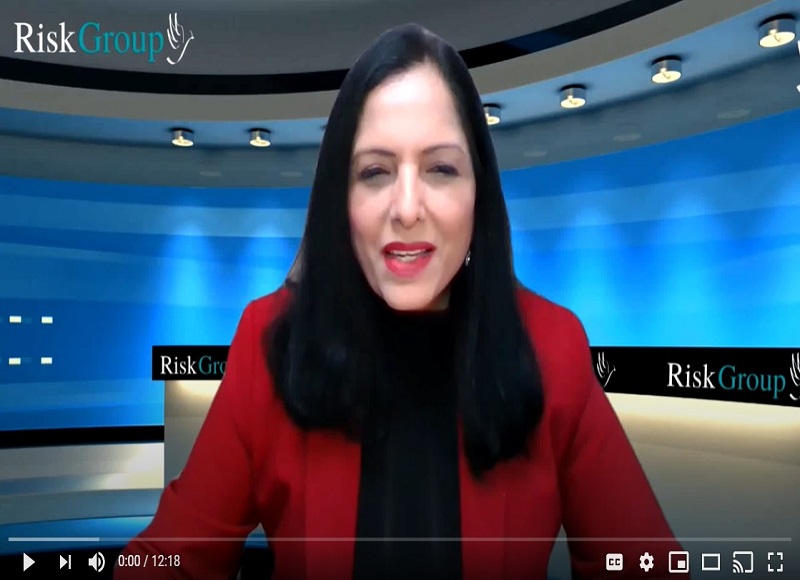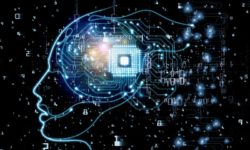Risk Group CEO, Jayshree Pandya, speaks about what it would take to navigate to the next normal.
The progress we have made as a species is historic. Our intense desire to explore the unknown beyond our known ecosystem of cyberspace, aquaspace, geospace, and space is shaping the course of human evolution. And it will continue to do so as long as new ideas, imagination, and innovation keep emerging. There is no doubt that over the years, our understanding of the universe has advanced due to the great efforts we have put into developing science and technology.
The enormous advances in science and technology—especially, astrophysics, astronomy, artificial intelligence, robotics, and quantum physics have brought us on a genuine path towards becoming an interplanetary species. Moreover, the world is becoming much smaller because we have created an entirely human-made space– cyberspace that has connected billions of people from across nations—and has also connected aquaspace, geospace, and space. Also, it has empowered individuals, groups, and nations/states, and has democratized innovation in the process. Now, when we evaluate the advances in science, technology, and medicine– especially advances in immunotherapy, genetic engineering, regenerative medicine, nanotechnology, biotechnology, and more—we understand how they have collectively advanced human health and increased our lifespan.
In the backdrop of all these advances one unique ability that we have achieved that stands out—especially when the world is on lockdown due to the COVID-19 pandemic, is the enormous ability that has brought us to the doorstep of where evolution is no longer driven by natural processes of mutation or natural selection. Instead, it is on its way to be driven by human choices using the tools and technology that have given us the power to create an entirely new species of human beings. In the coming years, we will see other species of humans walking around us that may have altogether different genomes, physiology, and traits than most of us. This will be the new normal.
As a result, pandemics as a portal to human evolution will be history in the coming years. Humans will not need to depend on the crude way of evolution. Perhaps this could be the very last pandemic. The very fact that we are no longer confined to what nature must offer is historic and massive. The advances in science and technology have brought us so close to the capability to create even living things. We have reached a point where the tools and technology used to define and design entire human and non-human genomes have caught up to our ability to construct them. In the coming years, we will be able to design and construct any cell, organism, or any biological species we want, with a growing selection of genomes. The time is almost here, where the ability to create or manipulate life seems restricted only by our imagination. While what nature has given us, is still the foundation of our natural biological ecosystem, we are now going to be able to build on this foundation and create a human-made, synthetic bio-ecosystem of our desire and definition.
While each new technology innovation brings progress for our species, it also historically brings us power for warfare due to its economic and security implications. The enormous innovative power that progress in science and technology has given us is shifting the power dynamics away from the select few across nations to many. It is even moving away entirely from humans to algorithms, redefining the very criteria of—and thereby threatening– the foundations of global peace and security. As a result, the coming years will see rising tensions within and between countries. The reason behind that is and will be the imminent restructuring of the systems and processes at all levels. While cyberspace has triggered this fundamental transformation, the COVID-19 pandemic has accelerated the need of redefining and redesigning systems at all levels.
“My latest book, Geopolitics of Cybersecurity, focuses on the rapidly emerging technological transformation from cyberspace that is fundamentally altering aquaspace, geospace, and space. In its size, scale, strength, and scope, the technology-triggered transformation that is emerging from cyberspace is unlike anything ever experienced before in prior industrial revolutions. The speed of the current ideas, innovations, and breakthroughs emerging from cyberspace has no known historical precedent and is fundamentally disrupting almost every component of a nation. While there is no easy way to compute how the ongoing cyberspace-triggered transformation will unfold, one thing is clear: the response to its security must be collective.
When cyberspace fundamentally alters aquaspace, geospace, and space, there is a need to understand the security-centric evolutionary changes facing the human ecosystem. The book answers questions like:
- What is the knowledge revolution?
- Should we be concerned about the dual-use nature of digital technologies, the do-it-yourself movement, and the democratization of destruction?
- What are the implications of fake news and information warfare on global politics?
- Are we being surveilled?
- Is access to cyberspace a human right?
- Will we soon see digital walls?
- How will nations stay competitive?
- How do we govern cyberspace?
The book, Geopolitics of Cybersecurity works to answer these questions, amidst a backdrop of increasing global competition, mistrust, disorder, and conflict. Conversations about cyberspace and technology are now inextricably linked to broader conversations affecting each one of us across nations, from trade policy and digital autonomy to cyber warfare and the weaponization of artificial intelligence. Ultimately, how nations handle these issues and conflicts will determine the fate of both cyberspace and humanity.
As a result, we need a new way of doing things; we need a new way of life that can weather all kinds of crises. And for that, we need to build resilient systems. While each nation is focused on defining and designing national security in narrow terms, our focus should be on collective security. Our focus should be on protecting the future of humanity. It is essential to note that so far, we did not have the technological capability to define, design, and develop the needed collective security systems in the past. However, now, we are equipped with the tools and techniques to imagine our successful collective future.
The reason is surviving as a species is a complex multidimensional process. Humanity has survived so far based on our group survival strategy. While we are used to living in a tribal mode: based on nationality, ethnicity, religion, nation-state, ideology, and more, it is time we evaluate: if we continue living in a standard model of tribalism, what will we gain and what will we lose. As long as we exist in the tribal version of our survival strategy, every new disruptive technology, every new pandemic will also bring us the power of self-destruction.
Since emerging technologies have dual-use, and because we still live in the mode of tribal thinking, every discovery and every new invention first and foremost becomes a weapon. We have witnessed a world with weapons that can eradicate life on planet Earth. From nuclear, chemical, biological, and autonomous weapons systems to electromagnetic weapons systems and more, the list of technology that can now destroy humanity keeps increasing. As a result, we are all living a paradox. There is no doubt that we are facing overwhelming global challenges as a species. Yet, it is important to recognize that if we did not create cyberspace, and if we did not build on the layers of cyberspace, we would still be facing existential risks at the moment.
As we all know by now, an outbreak of viral pneumonia centered around Wuhan, Hubei, China is now a full-blown pandemic impacting most nations. The coronavirus outbreak is a terrible human tragedy at all levels. It is not just a health crisis of immense proportion; it is also an economic and security crisis that is shaking the foundations of many nations’ existence. The impact of this shaking of the economic pillars of nations’ economy and security is being felt by everyone, everywhere. With the rapid spread of COVID-19, there is enormous uncertainty for nations and all of their components at all levels. So, irrespective of individuals and entities across nations, a million questions are racing through everyone’s minds.
In this unprecedented new global reality, there is going to be a dramatic restructuring of the fundamentals of economic and social order in which humans, business, society, and the economy have traditionally operated. How exactly this pandemic crisis-driven restructuring unfolds depends on our understanding of the meaning of life and growth. It is our ability to re-engineer and recreate ourselves and our ecosystem that will allow us to overcome our limitations and will be a major contributing factor to the survival of our species.
We want traits that may make us more radiation-resistant for our coming tomorrow. This is something we want to do if we ever want to live in spaces beyond earth, colonize Mars, and more. We also want traits that can give us the ability to breathe underwater. We want traits that will give us an ability to turn on and off our genes and gene expression based on our needs. We want traits that can give us the ability to communicate thoughts without any computer interface. We want traits that would allow us to communicate with other living species. We want many such new traits. So, let us focus on developing these needed traits to changing the meaning of life as we know it. Let us focus on the future of humanity.
We can either step forward into meaningful growth or stay where we are. We can grow in many different ways—but the essence of all growth starts with a willingness to change for the better. Now, as we go through life and all the obstacles and challenges it brings to us, we form opinions and feelings on various situations based on our past experiences, values, and beliefs that we all hold. However, many times like now, we are faced with situations that are actually growth opportunities in disguise. We need to be able to realize that there is an opportunity to change our species for the better.
Each pandemic has made us stronger as a species, and this pandemic will be no different. For that to happen, we need to be united as a species in our efforts to first and foremost understand how to stop the pandemics and solve the tortuous path of our evolution. For that, we need to keep our eyes on the problems facing humanity.
I hope that humanity can count on each one of us.





 Security Impact of COVID-19
Security Impact of COVID-19